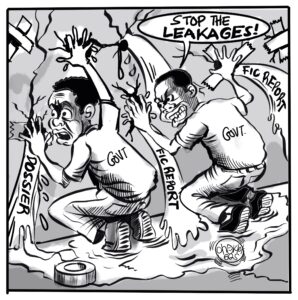ECONOMIST Professor Oliver Saasa says board fees are normally not as hefty as US$500,000 and they are also never paid from a private account.
And Prof Saasa has insisted that when an institution such as the Industrial Development Commission (IDC) is headed by the Head of State, the end result is transgressions.
An investigation revealed that three top IDC officials received in excess of US$500,000 as kickbacks from Chinese nationals during the share purchase transaction in which Marcopolo Tiles Limited sold a minority stake for US$44.8 million.
But Marcopolo Tiles Limited chief executive officer Huang Yao Chi denied paying any form of gratification to top government officials or senior managers at the IDC, claiming that whatever payment was made was in form of “board fees”.
Commenting on this in an interview, Prof Saasa said something smelled like a rat.
“It is claimed that this money was board fees for the members of the board of directors. Board fees are never paid in advance. They follow a board meeting. You only get board fees based on the meeting that you have attended. Usually, I would not expect that such board fees have so much to reflect as to what you have revealed, that sounded to be quite hefty. It raises fundamental questions. Board fees are taxable either the one who receives them pays directly and must declare them at the end of the annual returns or some companies pay it on your behalf so it is deducted already. Because it is statutory, the board fees must come from the company account. Board fees must not come from a private account of the majority shareholders, if that is true, that smells like a rat,” Prof Saasa said.
And Prof Saasa insisted that it was problematic for the Head of State to head the IDC.
“The chairman of the board of directors of IDC is no other than the President of Zambia. When you allow a politician, and for that matter a Head of State, to be in charge of a board and the other board members may be permanent secretaries, how do you expect those people to manage an independent, accountable and responsible board of directors if the head is no other than your appointing authority at another level?” Prof Saasa asked.
“How do you have a situation where the board are held accountable for their actions, but the one who is the chairman of the board has immunities as Head of State. And yet the law on corporate governance demands that you are held accountable for your actions? How do you interpret a situation where the chairman of the board of directors is the President of Zambia? Then you end up with transgressions of this magnitude. If indeed these are confirmed, you are placing the office of the Head of State in disrepute. So that becomes a problem.”
He said those who held public office were supposed to be held accountable.
“Those that are tasked to look after the interests of the public must be held accountable for their actions. And anything that is suspicious must be followed to the latter. And those that are found wanting must be brought to book. How can you entrust taxpayers’ money to that magnitude and buy shares in a company like that before you know whether the market is right? How do you get so much money and pump it into something without due diligence? If at all these executives are found wanting, it looks like there is legitimate reason why things must be investigated,” he said.
“I believe that good corporate governance is important. Many times we talk about good governance in the political realm, in the political area where you expect politicians to make decisions that respect the rule of law. But we have to understand parastatals are exactly like government, they belong to the people. These are companies that got instituted to represent the public in these investments. The same rules that govern our expectations from the politicians are the same rules that must govern the behavior of those that are given the responsibility to look after the interest, the assets, the investments of the public. IDC was created to be a holding company for public interests in different arms of government.”
He said the investment in Marcopolo Tiles Company should have been subjected to public disclosure.
“The procurement of interests and shares in that company was not according to my interpretation of good corporate governance. Any public holding company, the whole transaction should have been subjected to public disclosure. The Zambians should have known that this is a decision that the government is taking on behalf of the Zambian people to invest in an enterprise of that nature. There is nothing wrong with investment. The failure to disclose and be transparent raised eyebrows. Zambians cannot be third parties; we should not have waited for a newspaper to reveal these things,” said Prof Saasa.
According to a News Diggers’ investigation, Marcopolo majority shareholders Zhang Lingling and Huang Yaochi paid IDC officials in excess of US$ 500,000 after IDC successfully purchased a minority stake in their company.
IDC paid Marcopolo Tiles Limited US$44.8 million as consideration for the purchase of a minority stake in that company, while NAPSA also paid another US$30 million to Marcopolo, which is strange as the company was barely two years at the time.
























